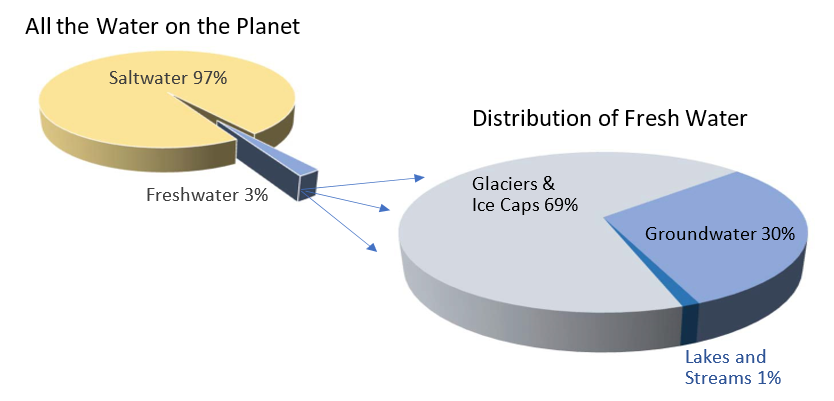Hydrogeological Investigations
Fresh water is needed for proper hygiene, growing crops, and many other everyday activities. It is estimated that 20 liters of clean, fresh water is needed by every person a day on the planet for good health. However, over 97% of all the water on our planet is saltwater and desalination is expensive and energy intensive. Desalination is not a viable option for most people in the world. In addition, most of the fresh water in the world is stored in glaciers and ice caps and is not readily available for use.
Surface water makes up only a small portion of available freshwater but it is often the most accessible source. For many, surface water is the only available source of water for their daily use, however, it is easily contaminated and is not safe to drink without treatment.
Groundwater is more difficult to find and use than surface water. Although this makes using groundwater more difficult as a drinking source in developing nations, it also helps protect this resource and is often the only feasible source of clean water for a community.
Hydrogeology is the application of principles of hydrology and geology to better understand the distribution and movement of water on and in earth materials (groundwater). Studies conducted to better understand surface water and groundwater resources are called hydrogeologic investigations and are essential to plan for the sustainable use of the water resource in a region.
Hydrogeologic investigations are a combination of research, field mapping, water sampling, and sometimes geophysics and test drilling to identify opportunities for developing a water supply. They help us:
• Understand the nature of the resource and the potential engineering requirements and constraints of it use,
• Understand the interactions between surface water and groundwater;
• Determine quantity and quality of available groundwater; and,
• Evaluate the sustainability and safety of the use of both surface water and groundwater.
Often the hydrogeologic investigation is focused on groundwater. Determining the location, depth, quantity, quality, and migration of groundwater can be challenging. Yet this information is critical for safe, sustainable development of a groundwater resource.
CWI team members and partners have extensive experience in conducting hydrogeologic investigations. These investigations include synthesizing available hydrogeological data, conducting geophysical surveys, geologic and aquifer mapping, and well drilling. Conducting a hydrogeologic investigation increases the success rate of well drilling program.

